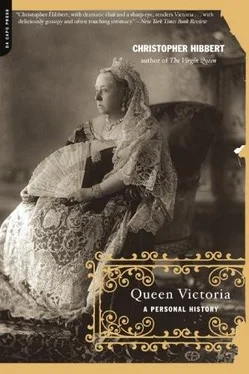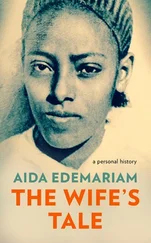Christopher Hibbert - QUEEN VICTORIA A Personal History
Здесь есть возможность читать онлайн «Christopher Hibbert - QUEEN VICTORIA A Personal History» — ознакомительный отрывок электронной книги совершенно бесплатно, а после прочтения отрывка купить полную версию. В некоторых случаях можно слушать аудио, скачать через торрент в формате fb2 и присутствует краткое содержание. Жанр: Биографии и Мемуары, на английском языке. Описание произведения, (предисловие) а так же отзывы посетителей доступны на портале библиотеки ЛибКат.
- Название:QUEEN VICTORIA A Personal History
- Автор:
- Жанр:
- Год:неизвестен
- ISBN:нет данных
- Рейтинг книги:5 / 5. Голосов: 1
-
Избранное:Добавить в избранное
- Отзывы:
-
Ваша оценка:
- 100
- 1
- 2
- 3
- 4
- 5
QUEEN VICTORIA A Personal History: краткое содержание, описание и аннотация
Предлагаем к чтению аннотацию, описание, краткое содержание или предисловие (зависит от того, что написал сам автор книги «QUEEN VICTORIA A Personal History»). Если вы не нашли необходимую информацию о книге — напишите в комментариях, мы постараемся отыскать её.
QUEEN VICTORIA A Personal History — читать онлайн ознакомительный отрывок
Ниже представлен текст книги, разбитый по страницам. Система сохранения места последней прочитанной страницы, позволяет с удобством читать онлайн бесплатно книгу «QUEEN VICTORIA A Personal History», без необходимости каждый раз заново искать на чём Вы остановились. Поставьте закладку, и сможете в любой момент перейти на страницу, на которой закончили чтение.
Интервал:
Закладка:
The youngest duke, the Duke of Cambridge, a man more respectable and financially responsible than his brothers, was not yet married; and when he did marry Princess Augusta of Hesse-Cassel in August 1818 the children of this marriage were so far down the line of succession that they could be dismissed by the Duke of Kent in his determined efforts to become the father of the future King or Queen of England.
The Duke of Kent was a disappointed man. Trained for a military career in Germany, he had not achieved the distinction or recognition which he believed he deserved. He had served in Gibraltar, in Canada and in the West Indies, and in all these places he had gained a reputation both for wild extravagance and the most strict and severe attention to military discipline: he would insist that the men under his command be roused at dawn and appear on the parade ground in impeccable condition and would punish infringements of his draconian rules by occasional executions and regular floggings of hundreds of lashes, as many as 400 being given for 'trifling faults in dress' and 999, the maximum permitted, for desertion. He left Canada accused of 'bestial severity'; and, upon his recall from Gibraltar in disgrace, he was accused by his elder brother the Duke of York - who had been appointed Commander-in-Chief of the Army - of provoking a mutiny by his conduct which 'from first to last was marked by cruelty and oppression'. He was given to understand that there would be no more military commands for him. 2
Charles Greville, the diarist and Clerk to the Privy Council, contended that the Duke of Kent was 'the greatest rascal that ever went unhung', 3while the Duke of Wellington, to whom Thomas Creevey related the story of the contretemps at Kent's breakfast table, regarded him as a figure of fun. At a ball in Brussels, where Wellington was serving as commander of the allied forces on the Continent after the defeat of Napoleon at Waterloo, Creevey was approached by the great Duke who said to him, 'Well Creevey, what has passed between you and the Corporal since you have met this time?' Creevey then told Wellington of a conversation he had recently had with the Duke of Kent 'Upon which,' so Creevey recorded, 'the Duke of Wellington laid hold of my button and said: "God damme! D'ye know what his sisters call him? By God! They call him Joseph Surface [the shameless hypocrite in Sheridan's School for Scandal]\" and then sent out one of his hearty laughs, that made every one turn about to the right and left to see what was the matter.' 4
Yet the Duke of Kent had his good points as well as his bad, as Wellington conceded: he was a good and intelligent, if rather garrulous, conversationalist with a gift for mimicry, and an even better after-dinner speaker; he was also a conscientious correspondent, keeping three or four secretaries busy at their desks. He was fond of music and, when in funds, employed the services of a large band.
However, like all his brothers except the Duke of Cambridge, he was more or less constantly entangled in debt. The several charities to which he lent his name were supported by money which, as often as not, had been borrowed from men who were not always repaid. It was a perennial grievance with him that he was not provided with an allowance adequate to his high position as a prince of the blood.
Yet for all his faults, the Duke was capable of affection and this affection had been returned not only by Mme de St Laurent but also by Princess Charlotte, whose favourite uncle he had been, and by Mrs Maria Fitzherbert, the Roman Catholic widow whom the Prince Regent had illegally married and with whom the Duke conducted a correspondence of easy and intimate friendship. For nearly thirty years the Duke had lived contentedly with Mme de St Laurent, and he did what he could to soften the blow when he declared that duty to his family forced him to send her away to live in Paris with her sister. 'You may well imagine, Mr Creevey, the pang it will occasion me to part with her,' he said to the Whig politician. 'I protest I don't know what is to become of her ... But before anything is proceeded with in this matter, I shall hope and expect to see justice done to her by the Nation and the Ministers ... Her disinterestedness has been equal to her fidelity.' 5He saw to it that she was provided with a generous allowance - which before long was much reduced - and he asked friends to go and see her to ensure that she was comfortable in Paris where she lived as the Comtesse de Montgenet, a courtesy title granted to her by King Louis XVIII. 'Our unexpected separation arose from the imperative duty I owed to obey the call of my family and Country to marry,' the Duke explained, 'and not from the least diminution in an attachment which had stood the test of 28 years and which, but for that circumstance' would have been kept up until one or other of them died. 6He later thanked Creevey and his wife for their kind attentions to the 'dear Countess' and earnestly asked him to give him his 'opinion of her health, her looks and her spirits very particularly.
The Duke at this time was forty-nine years old. He was tall and fat and stately in a ponderous way, with luxuriant whiskers dyed dark brown and a head without much hair. His breath smelled of garlic and his clothes of tobacco. He was attentive to women and very polite. He had the fleshy lips and rather protuberant eyes of the Hanoverians but he was handsome enough and carried himself like the soldier he was proud to have been.
He was of most regular habits, getting up at five o'clock, even earlier than his father, and eating and drinking sparingly. He had good reason to suppose that, if he found a suitable wife, he would soon be the father of children as healthy as he was himself. Already, before Princess Charlotte's death, he had begun the search for a wife, in the hope that Parliament would grant him a decent allowance to support one in the same way that his brother, the Regent, had been helped financially upon his disastrous marriage to Princess Caroline of Brunswick. Edward considered that the £25,000 a year settled upon the Duke of York after his marriage ought 'to be considered the precedent'. 7Having borrowed £1,000 from the Tsar for the cost of his journey, he had travelled to Germany to inspect the Tsarina's sister, Princess Katherine Amelia of Baden, but he had not liked the look of the 'old maiden' of forty-one whom he had found at Darmstadt; and his thoughts had later turned to Princess Victoire - sister of Prince Leopold of Saxe-Coburg, who had married the Regent's daughter, Princess Charlotte.
The Regent had been against the marriage of his daughter to Prince Leopold at first. He had conceded that Leopold was a good-looking, gifted fellow, charming in a rather solemn kind of way, and that he would probably treat Charlotte well. But there was something in the ingratiating suavity of his manner which was decidedly distasteful, and the ponderousness of his cautious approach to life was rather irritating. Adept at choosing nicknames, the Regent called him ' le Marquis peu a peu'. 8 The less inventive Lord Frederick FitzClarence dismissed him as a 'damned humbug'; 9and Princess Lieven, the Russian Ambassador's wife, found him 'wearing and ... with his slow speech and bad reasoning, a jesuit and a bore'. 10He had his supporters and admirers, however. Lady Ilchester, for example, told a friend that he was 'enchanting as far as appearance and manner' were concerned. He was 'like an Englishman in all but the ease, elegance and deference of his manners'. 11Having discouraged the match, the Regent had learned with annoyance that his brother, the Duke of Kent, was promoting it and allowing correspondence between the young couple to pass through his hands.
Princess Charlotte herself had not at first been much taken with her suitor, 'Prince Humbug'. If she were to marry him, she had said, it would be 'with the most calm and perfect indifference'. 12But, as she had grown to know him better, she had fallen in love with him. He was, she decided, 'the only being in the world who would have suited me and who could have made me happy and a good woman'. 13He, in turn, had been devoted to her; their short marriage spent mostly at Claremont Park, the handsome house built in 1771 for the first Lord Clive and bought for them on the outskirts of Esher, had been a very happy one, and Leopold had been distraught by her death, kneeling by her bed and kissing her lifeless hands for over an hour. He had not, however, been too upset to write to his sister at Amorbach, urging her to give an encouraging answer to the proposal of marriage which she had received from the Duke of Kent.
Читать дальшеИнтервал:
Закладка:
Похожие книги на «QUEEN VICTORIA A Personal History»
Представляем Вашему вниманию похожие книги на «QUEEN VICTORIA A Personal History» списком для выбора. Мы отобрали схожую по названию и смыслу литературу в надежде предоставить читателям больше вариантов отыскать новые, интересные, ещё непрочитанные произведения.
Обсуждение, отзывы о книге «QUEEN VICTORIA A Personal History» и просто собственные мнения читателей. Оставьте ваши комментарии, напишите, что Вы думаете о произведении, его смысле или главных героях. Укажите что конкретно понравилось, а что нет, и почему Вы так считаете.











